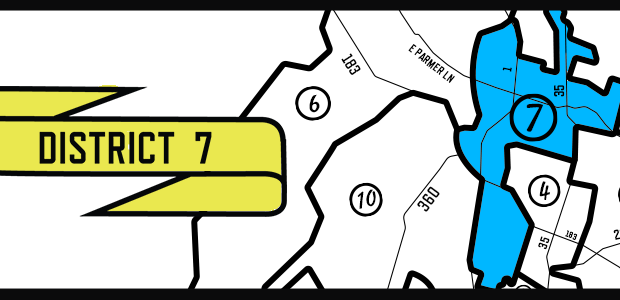Pool looks back at past year, outlines future plans
Monday, January 4, 2016 by
Tyler Whitson City Council Member Leslie Pool made the environment, city services and transparency major issues in her 2014 campaign, and based on her look back at the freshman year of Austin’s first 10-1 Council, she remains concerned about those issues. The District 7 representative talked with the Austin Monitor on Dec. 15 about the new Council’s first year and her priorities for next year.
“I think what I would lead off with is our creation of the new protocols, the new system and getting to know one another and coalescing as a group,” Pool said, referring to the committee and public input structures that Council created at the beginning of its tenure. “I think we established a baseline for the Council, and we took some pretty important votes this year.”
The votes Pool referred to include adopting the current city budget, passing the 2015 Austin Community Climate Plan, directing Austin Energy to enter into at least 400 megawatts’ worth of solar energy contracts, moving toward digital city election campaign finance reports, passing a lobby registration resolution and allocating most of the remaining dollars in the “quarter-cent fund” collected by the Capital Metropolitan Transportation Authority evenly across all districts.
Pool said that she looks forward to reviewing the lobby registration ordinance that city staff will bring forward next year and has additional plans in mind. “We don’t have any enforcement really to speak of – we need to boost that up,” she said.
Many of the victories that Pool cited took place as part of the budget process. These consist of adding more than $6.5 million in spending for health and human services – including $150,000 for a healthy corner store initiative – as well as funding improvements to the city’s five most dangerous intersections as identified by the Austin Transportation Department, extending library hours and increasing the Parks and Recreation Department budget.
The climate plan “was key and fed into the important preliminary work that had good effect at the U.N. climate conference,” Pool said, referring to the climate change talks in Paris that she and Mayor Steve Adler attended in December. “Austin is definitely leading the way on the power purchase agreements,” she added, referring to the solar contracts.
Pool also looked ahead to the decisions that Council will have to make next year relating to Austin Energy, including restructuring rates based on the cost of providing service to customers and deciding whether to construct a 500-megawatt combined-cycle natural gas plant that staff proposed and Navigant Consulting recently endorsed following an independent study.
“That will also be an affordability issue,” said Pool, referring to the rate study. “The one kind of heads-up alert to me was when (Austin Energy Chief Financial Officer Mark Dombroski) said (in a Dec. 15 briefing) that cost of service for residential is falling short – and what that means is a rate increase, so how that plays out with the Council will be really interesting to follow.”
Pool said that she looks forward to revisiting the CodeNEXT Land Development Code overhaul that Council will consider adopting next year, discussing the need for more public transit (particularly in East Austin), working to enhance the availability of public parkland and kicking off a study of the Burnet Road corridor, which she called the “spine” of her district.
Pool’s priorities for Council next year also include taking a hard look at drainage infrastructure in an attempt to address flooding issues, reconsidering whether to approve development that could exacerbate flooding and developing a policy for when to buy out floodplain properties.
“Another deep concern of mine is what are we doing to prevent future flooding, and the corollary, of course, is how much money do we have to do the buyouts, the significant buyouts that we’ve been faced with,” Pool said, noting that she supported the Onion and Williamson creek buyouts that Council approved this year.
“I feel like we have some responsibility for the fact that they flooded because of policies that have allowed for development without adequate infrastructure,” Pool explained.
Pool also commented on the relationship between CodeNEXT and future development. “I think that the future look of our city is going to be imprinted in CodeNEXT,” she said.
“The intention of CodeNEXT is to reduce the number of variations from code that we have so that, ideally, zoning cases coming to Council would be reduced dramatically,” Pool continued. “The reality is – I don’t know what will happen. I think variances will continue to happen.”
You're a community leader
And we’re honored you look to us for serious, in-depth news. You know a strong community needs local and dedicated watchdog reporting. We’re here for you and that won’t change. Now will you take the powerful next step and support our nonprofit news organization?



